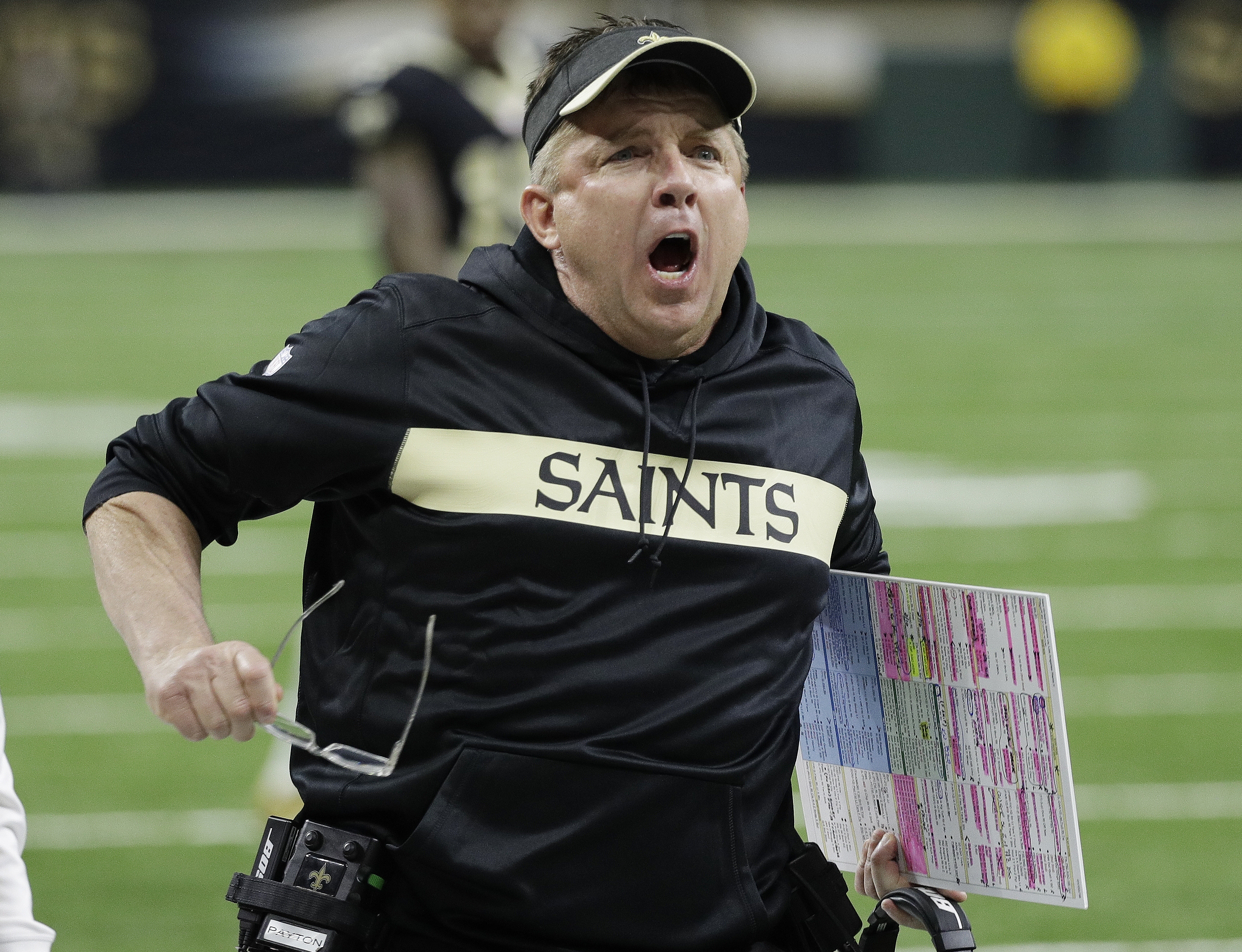
Payton: Obvious missed call cost Saints a Super Bowl berth
NEW ORLEANS (AP) — Sean Payton was glassy-eyed, calm and shrugged his shoulders at times, seemingly resigned to New Orleans’ bitter fate — as unfair as he thought it was.
And the Saints coach said NFL executives he spoke with by phone after a 26-23 overtime loss to the Los Angeles Rams agreed with him that officials on the field missed two obvious penalties on one late, game-turning play that might have prevented the Saints from advancing to the Super Bowl.
Officials could have called pass interference and helmet-to-helmet contact on Rams cornerback Nickell Robey-Coleman as he flattened Saints receiver Tommylee Lewis on an incomplete pass inside the Rams 10-yard line with 1:45 left in a tie game. The play occurred in close range of two officials along the sideline who never pulled out their flags.
NFL senior vice president of officiating Al Riveron “couldn’t believe” no penalty call was called on the play, Payton said.
“It’s tough to get over it,” Payton said. “My problem with it is, I just don’t know, if we were playing pickup football in the backyard … it was as obvious a call — and how two guys can look at that and arrive at their decision? It happened though.”
As anger-infused, full-throated boos rained down relentlessly from the Superdome stands, replays on the stadium’s expansive video screens clearly showed Robey-Coleman’s high hit occurring before Drew Brees’ pass toward the right sideline arrived at the spot where Lewis might have tried to make a play on the ball if he weren’t being knocked to the turn.
“I bounced up looking for a flag and didn’t see one, so I was kind of shocked about that,” Lewis said. “I saw what everybody else saw.
“You all feel like it was obvious? There it is. Everybody knows it was obvious,” Lewis added. “I don’t know what else to say about it.”
Even Robey-Coleman seemed surprised.
“Came to the sideline, looked at the football gods and was like, ‘Thank you,'” Robey-Coleman said. “I got away with one tonight.”
Rams coach Sean McVay, now headed to his first Super Bowl at age 32, was less inclined to scrutinize the call publicly.
“Certainly I’m not going to complain about the way it was officiated, but I thought it was a competitive play,” McVay said. “I thought they let the guys compete within the framework of the rules and that’s part of what NFL football is about.”
Had a flag been thrown, the Saints would have run the clock down to the final seconds before setting up a short field goal try clinch the franchise’s second NFC title, Payton said. Instead, the Saints had to try the kick with more than 1:40 left — enough time for the Rams to drive for a tying field goal. The game then went to overtime, when an interception by Rams safety John Johnson III set up Greg Zuerline’s 57-yard game-winning field goal.
“We’ll probably never get over it,” Payton added.
Saints quarterback Drew Brees, who at age 40 is running out of chances to get to a Super Bowl, said it was “tough to swallow” the non-call.
“Plenty of times throughout the season, there’s calls that go against you, go for you,” Brees said. “But obviously in a situation like that where it seemed like everybody in the world saw it, it’s tough.”
Both Payton and Brees suggested that the way the call tarnished the result of a conference title game could stimulate discussion about widening replays to look at reviewing certain penalties committed at certain points of the game, as has happened in the NBA.
“There’s just too much at stake,” Payton said. “And listen, it’s a hard job for those guys. It’s happening fast. But I don’t know if there was ever a more obvious pass interference.
“We all want to get it right, right? We’ve got plenty of technology to speed things up,” Payton added. “Look, I’m on the competition committee. So, hopefully that provides a voice. I hope no other team has to lose a game the way we lost that one today, though. We were in position. … We’d be on our knee for three plays and — it’s disappointing.”
Brees said he expects the NFL’s replay rules to “constantly evolve as they try to make this game batter and try to make sure that it is as fair as possible.”
“There’s a lot happening out there and it happens very, very fast,” Brees said. “Obviously, if they were replaying pass interference or if somebody got hit early before the ball got there, then I’m sure that would have been reviewed today — and it would been found that that was P.I.
“It’s easy to sit here and criticize. I’m sure that because of this, as a result of this, I’m sure there will be a lot of talk about potentially reviewing penalties,” Brees added. “Just like all the reviews that go up in the booth inside of two minutes. Maybe that’s something that will happen in regards to certain penalties as well that are game-changing penalties, which obviously that was today.”
___
For more AP NFL: https://apnews.com/NFL and https://twitter.com/AP_NFL
The Western Journal has not reviewed this Associated Press story prior to publication. Therefore, it may contain editorial bias or may in some other way not meet our normal editorial standards. It is provided to our readers as a service from The Western Journal.
Truth and Accuracy
We are committed to truth and accuracy in all of our journalism. Read our editorial standards.
Advertise with The Western Journal and reach millions of highly engaged readers, while supporting our work. Advertise Today.












